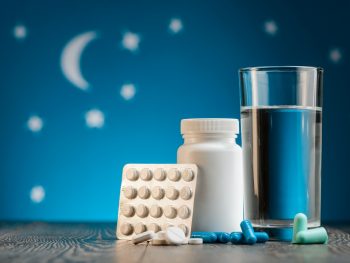If you don’t know what delayed sleep phase syndrome is, you’ll find this information helpful. How many times have you gone to sleep in the middle of the night only to find yourself feeling sleepy all throughout the day? If it’s happened often, we think you might be one of the 0.15 percent of Americans who experience DSPS.
Delayed Sleep Phase Syndrome, or DSPS, is a lifelong chronic condition that affects a small fraction of people worldwide. It is the result of the natural circadian rhythm (or in simpler words, the sleep cycle) being disrupted or disturbed.
But don’t confuse DSPS with regular insomnia or jet lag. Read on to find out more about DSPS and its risks. Think you have a friend who might be experiencing the symptoms? Then remember to SHARE this information with them.
What Is Delayed Sleep Syndrome Or Disorder?
Delayed Sleep Syndrome is, simply put, a disruption of the natural sleep cycle of humans which can lead to heavy insomnia, sleep deprivation, depression, difficulty concentrating, and constant moodiness.
Most people with DSPS go to sleep later than usual and wake up later than what is commonly expected. However, they are able to get a full 8 hours of sleep, unlike insomniacs.
DSPD or DSPS is just one of the many circadian rhythm disorders that can affect the human body and mind dramatically. At first, it may not seem like much. But feeling drowsy all day, being less productive at work, and difficulty focusing on your social life all take a toll. Then you will begin to realize that sleeping disorders are just as serious and unhealthy.
There is no cure for DSPS, though certain measures can be taken.
What Causes Delayed Sleep Phase Syndrome?
There are no known exact causes of DSPS. However, some doctors speculate that the following could be possible causes:
- Genetic Makeup. Sometimes, the DSPS can be linked to a single gene, which is more often than not inherited, but can be formed as a mutation as well.
- Age can play a huge factor. Individuals who are in their mid-teens or young-adulthood are more at risk than others. Specifically, children going through puberty reported DSPS.
- Over-exposure to light after the sun sets. This can disrupt the sleep cycle and cause the brain and mind to be confused.
- Little to no exposure to sunlight causes disturbances and mayhem in the circadian cycle.
- Other underlying disorders such as insomnia, depression, ADHD, or OCD.
What Are The Symptoms Of DSPS?
Hold up. Before you go about contacting your local psychiatrist, it is important to always confirm if you actually have DSPS or not.
We do highly advise that you visit a specialist to get yourself checked just in case. However, if you lack the budget or energy, the following list of symptoms should be enough to enlighten you:
- Falling asleep well beyond midnight, even if one is fully prepared to sleep at around 10 or 11.
- Waking up later than what is considered “normal” (usually at around 6:30 am).
- Constant drowsiness during work or school.
- Mood swings.
- Inability to concentrate due to sleepiness.
- While insomnia and DSPS are not the same disorder, the latter can cause the former. People with DSPS rarely get 8 hours of sleep due to schedules.
- Minor or moderate or (rarely) major symptoms of depression.
- Abuse of caffeine, sedatives, drugs (recreational and medicinal), and alcohol in order to stay awake.
- Sometimes, constant drowsiness can cause accidents and clumsiness, which is extremely dangerous.
- Lack of other sleep disorders, though DSPS can cause circadian rhythm disorders.
DSPS Vs. Jet Lag and Chronic Insomnia
Most individuals with DSPS confuse their symptoms with that of jet lag and chronic insomnia. While all three are forms of sleep/wake cycle disorders, they are quite different from each other. Read below to find out more:
DSPS Vs. Jet Lag
Delayed Sleep Phase Disorder or Syndrome is a disruption of the natural human sleep cycle, and while it can have similar symptoms to jet lag, there are vast differences.
Firstly, jet lag is caused by trans-meridian travel. This means that the person has to travel between time zones, and this usually occurs in passenger jet aircraft. Whereas DSPS can be caused by a number of factors, including genetic makeup and age, and the exact cause is unknown.
Secondly, jet lag is a temporary disorder. Yes, if you’re constantly traveling than the problem can get worse. But this disorder usually stops after several days once the person becomes accustomed to the new time zone. However, DSPS is a chronic condition. No, this doesn’t mean that it’s permanent. However, it can take longer to correct, and sometimes never goes away.
DSPS Vs. Chronic Insomnia
Chronic Insomnia is defined as a disorder in which the individual is unable to sleep properly for long periods of time. DSPS and insomnia are closely related, but they differ in a number of ways. Hundreds of doctors and psychiatrists misattribute chronic insomnia to DSPS.
Firstly, insomnia is characterized by lack or complete absence of sleep. Individuals who complain of true insomnia may only get around 3-4 hours or less of sleep. However, individual with true DSPS have trouble falling asleep, but once in bed, they are able to get a complete 8 hours of sleep or more.
However, most are unable to complete their sleep cycle due to schedules. But if given the time and opportunity, they are able to sleep soundly, while insomniacs can’t sleep regardless of the opportunity.
Secondly, the treatments vary. While insomniacs are typically treated with benzodiazepines or regular psychiatric treatments, DSPS can be much harder to get rid of. The cures (although limited) include getting help from a specialist to reestablish the sleep cycle. This may take months.
I Think I Have DSPS. Am I Alone?
Certainly not. While it can seem so when it comes to most psychiatric disorders, it can help relieve some tension to know that you’re not the only one. In a survey done, it was found that around 7 to 16 percent of adolescents and teenagers reported having DSPS.
They usually call themselves “night owls” finding it trendy and fashionable to sleep late. The dangers of this, however, are nonetheless the same.
For adults, the numbers are lower. Only about 0.15 percent, or 3 in every 2000. This may also be likely due to the fact that people often confuse DSPS with insomnia. A study found that more than 10 percent of individuals who complained about insomnia were actually experiencing DSPS.
How Can I Prevent DSPS?
While DSPS has no cure, certain measures can be taken to prevent it.
Firstly, ensure that you’re getting enough sleep. Who knows? Maybe a tiny disruption can lead to massive circadian dysrhythmia and DSPS. Termed “the Butterfly Effect”, even a tiny change can have enormous consequences. Ensure that your sleep cycle is preserved throughout the day. Try to go to sleep at midnight, and wake up at around 6 or 7 in the morning.
Get rid of studies and untimely schedules. Yes, your job will give you a sustained life, but that life is useless if you’re gonna spend it in constant fatigue. Trust us when we say that you don’t want to fall victim to these disorders. They can be entirely irritating.
Secondly, stay in the open air. While some people prefer to stay indoors, it is oh-so-important to get some fresh air. Even standing on your balcony or front lawn and opening the windows will help relieve some stress and improve sleep.
Delayed Sleep Phase Syndrome Treatments
So you were a little late on the prevention and managed to end up with the irritating disorder? That’s bad news, indeed. But all hope is not lost, fortunately.
Yes, we have mentioned that the syndrome is chronic and that there is no specific cure. But a bit of therapy and hormone treatment can go a long way in relieving you of the pain.
Method #1: Treat Underlying Symptoms First
While it may seem impossible, DSPS can actually be a result of underlying conditions such as sleep apnea, depression, OCD, ADHD, and sometimes even insomnia.
The best way to identify this is to consult with a local psychiatrist to find out more about your symptoms and if they are induced by other disorders or not.
In general, underlying depression has been linked to DSPS, and a study found that around half of all adults who reported having DSPS were also quoted as having gone through depression.
Method #2: Find A Good Doctor
When it comes to circadian disorders, psychiatrists are our safe haven. Look for a good psychiatrist, particularly one that specializes in chronotherapy. Consult with a psychiatrist to first check if you have DSPS, then the two of you can work on new and improved ways to battle the symptoms.
Method #3: Try Melatonin Treatment
Melatonin is the hormone that induces sleep in humans and some other animals. Consult with a therapist to see if the option is open for you. According to an expert, moderated doses of melatonin (about 1 to 0.5 mg) can help you sleep earlier. It is always best to check with a psychiatrist on this matter.
- You may also like: How much melatonin is too much
Method #4: Try Light Therapy
It has been speculated that lack of sunlight or too much sunlight in waking and sleeping hours contributes to DSPS. Consult your therapist to get proper instructions on this. Basically, you’re supposed to expose yourself to sunlight in your natural waking hour. Just be sure to talk to a therapist about it.
Final Words
Delayed Sleep Phase Disorder can be a menace, but there is still hope for all of us.
In the end, remember that you are all worthy and loved.








Leave a Reply